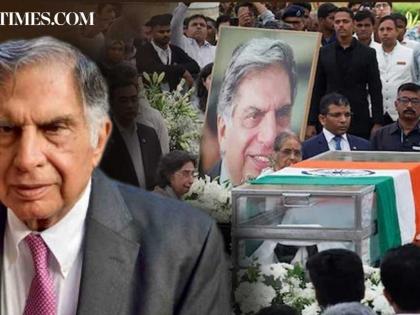Ratan Tata Funeral: Former Tata Group Chairman’s Last Rites to Be Conducted As Per Parsi Traditions
By Lokmat English Desk | Updated: October 10, 2024 15:47 IST2024-10-10T15:44:38+5:302024-10-10T15:47:37+5:30
Ratan Tata, the 86-year-old Chairman Emeritus of Tata Group and a towering figure in Indian industry, passed away on ...

Ratan Tata Funeral: Former Tata Group Chairman’s Last Rites to Be Conducted As Per Parsi Traditions
Ratan Tata, the 86-year-old Chairman Emeritus of Tata Group and a towering figure in Indian industry, passed away on Wednesday at Mumbai's Breach Candy Hospital. The Maharashtra government has announced that he will be given a state funeral, while his last rites will follow the customs of the Parsi community, to which he belonged. In Zoroastrianism, the religion followed by Parsis, burial and cremation are avoided to prevent contamination of nature’s sacred elements—earth, water, air, and fire. Instead, the body is returned to nature through a practice called Dokhmenashini, which reflects the belief that the body is a gift from nature that must be returned without causing pollution.
The funeral rites begin early in the morning, when the body is washed and prepared by Nassesalars, specialized pallbearers trained for this task. The deceased is dressed in traditional Parsi attire, which includes a white shroud, the sudreh (a cotton vest), and kusti (a sacred cord tied around the waist). Prayers and blessings, performed by Parsi priests, mark the next stage of the ceremony. These rituals are meant to aid the soul's transition to the afterlife. Family and close relatives gather to pay their respects and take part in these solemn prayers. Traditionally, the body is taken to a Tower of Silence, or Dakhma, where it is placed atop the structure and left to be consumed by vultures, allowing the body to return to nature.
This ancient practice helps avoid polluting the earth, fire, or water. However, due to modern challenges such as the declining vulture population and environmental concerns, adaptations have been made. In some urban areas, solar concentrators are used to hasten decomposition. In cases where Dokhmenashini is not feasible, some Parsi families opt for electric cremation, which aligns with Zoroastrian principles while offering a more practical, eco-friendly approach.While Ratan Tata’s last rites will honor his Parsi heritage, the state funeral announced by the Maharashtra government will also reflect his immense contributions to India. His funeral will be a blend of centuries-old traditions and state recognition, befitting a man who left an indelible mark on the country.
Open in app